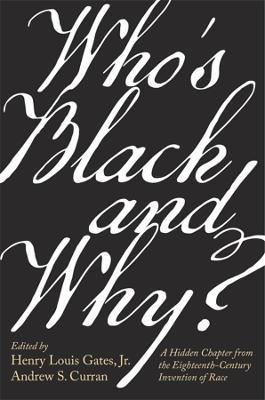Who's Black and Why?: A Hidden Chapter from the Eighteenth-Century Invention of Race

Who's Black and Why?: A Hidden Chapter from the Eighteenth-Century Invention of Race
"A fascinating, if disturbing, window onto the origins of racism."
--Publishers Weekly
--Jill Lepore, author of These Truths: A History of the United States The first translation and publication of sixteen submissions to the notorious eighteenth-century Bordeaux essay contest on the cause of black skin--an indispensable chronicle of the rise of scientifically based, anti-Black racism. In 1739 Bordeaux's Royal Academy of Sciences announced a contest for the best essay on the sources of "blackness." What is the physical cause of blackness and African hair, and what is the cause of Black degeneration, the contest announcement asked. Sixteen essays, written in French and Latin, were ultimately dispatched from all over Europe. The authors ranged from naturalists to physicians, theologians to amateur savants. Documented on each page are European ideas about who is Black and why. Looming behind these essays is the fact that some four million Africans had been kidnapped and shipped across the Atlantic by the time the contest was announced. The essays themselves represent a broad range of opinions. Some affirm that Africans had fallen from God's grace; others that blackness had resulted from a brutal climate; still others emphasized the anatomical specificity of Africans. All the submissions nonetheless circulate around a common theme: the search for a scientific understanding of the new concept of race. More important, they provide an indispensable record of the Enlightenment-era thinking that normalized the sale and enslavement of Black human beings. These never previously published documents survived the centuries tucked away in Bordeaux's municipal library. Translated into English and accompanied by a detailed introduction and headnotes written by Henry Louis Gates, Jr., and Andrew Curran, each essay included in this volume lays bare the origins of anti-Black racism and colorism in the West.
PRP: 216.68 Lei
Acesta este Prețul Recomandat de Producător. Prețul de vânzare al produsului este afișat mai jos.
195.01Lei
195.01Lei
216.68 LeiLivrare in 2-4 saptamani
Descrierea produsului
"A fascinating, if disturbing, window onto the origins of racism."
--Publishers Weekly
--Jill Lepore, author of These Truths: A History of the United States The first translation and publication of sixteen submissions to the notorious eighteenth-century Bordeaux essay contest on the cause of black skin--an indispensable chronicle of the rise of scientifically based, anti-Black racism. In 1739 Bordeaux's Royal Academy of Sciences announced a contest for the best essay on the sources of "blackness." What is the physical cause of blackness and African hair, and what is the cause of Black degeneration, the contest announcement asked. Sixteen essays, written in French and Latin, were ultimately dispatched from all over Europe. The authors ranged from naturalists to physicians, theologians to amateur savants. Documented on each page are European ideas about who is Black and why. Looming behind these essays is the fact that some four million Africans had been kidnapped and shipped across the Atlantic by the time the contest was announced. The essays themselves represent a broad range of opinions. Some affirm that Africans had fallen from God's grace; others that blackness had resulted from a brutal climate; still others emphasized the anatomical specificity of Africans. All the submissions nonetheless circulate around a common theme: the search for a scientific understanding of the new concept of race. More important, they provide an indispensable record of the Enlightenment-era thinking that normalized the sale and enslavement of Black human beings. These never previously published documents survived the centuries tucked away in Bordeaux's municipal library. Translated into English and accompanied by a detailed introduction and headnotes written by Henry Louis Gates, Jr., and Andrew Curran, each essay included in this volume lays bare the origins of anti-Black racism and colorism in the West.
Detaliile produsului










